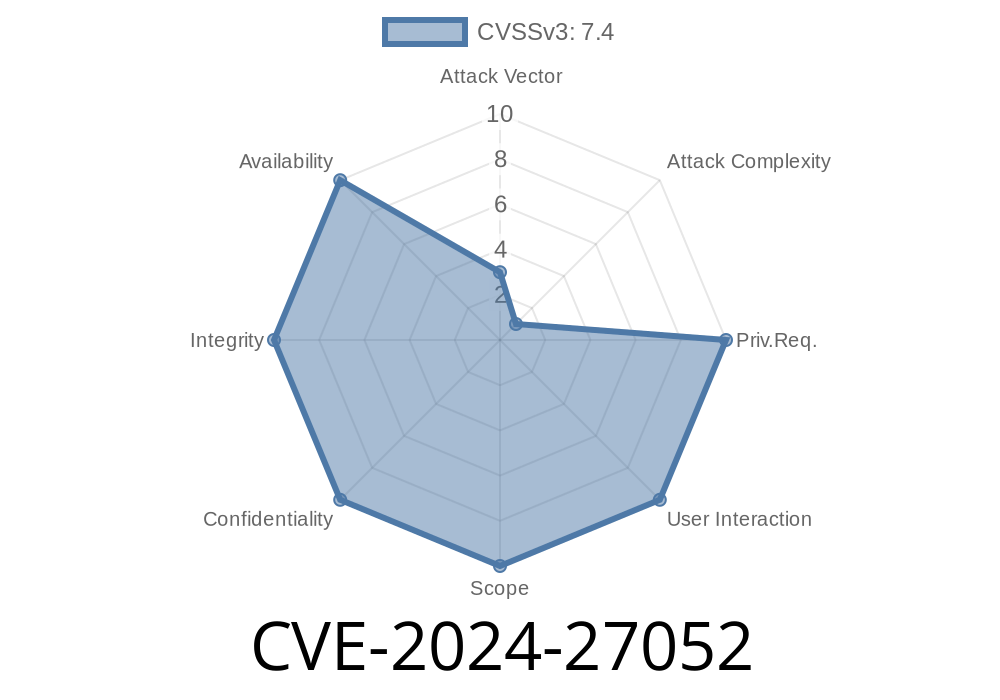The Linux kernel is the heart of many systems, including desktops, servers, and embedded devices. Its WiFi drivers power internet connectivity for a huge number of laptops and gadgets. This makes any security issue in these drivers a major concern.
In early 2024, a flaw was discovered and fixed in the Realtek USB WiFi driver, known in the kernel as rtl8xxxu. The issue was tracked as CVE-2024-27052.
This is a story of how an innocent-looking line of code could have let attackers crash your WiFi, leak information, or worse — and what the Linux team did to fix it.
What is CVE-2024-27052?
At its core, CVE-2024-27052 is a bug that could cause a "use-after-free" in the RTL8XXXU driver. In plain language, code in the driver could access memory that was already freed, possibly leading to crashes, random code execution, or information leaks.
Where's the Bug?
It sits in code handling "workqueues," specifically a workqueue named c2hcmd_work. When the device (your USB WiFi dongle) was turned off, or the driver was unloaded, this workqueue could still be running. Some memory it was using might be freed at the same time, leading to that use-after-free.
Here’s a simplified version, before the patch
// Inside rtl8xxxu_stop()
free_some_resources();
unregister_device();
// ...done, or are we?
The problem? There’s a background job (c2hcmd_work) scheduled on a workqueue. If it’s still running after you free resources, it might try to access things that are already gone.
System unloads the driver or stops the USB WiFi dongle.
2. Main thread frees memory/resources.
The Patch: Adding cancel_work_sync()
Once the bug was spotted, the fix was simple and safe: shutdown the workqueue before freeing its resources.
The patch added a call to cancel_work_sync() for the c2hcmd_work item. This call waits for any running work to finish before continuing, ensuring no one is using freed memory.
The Fixed Code Looks Like This
// Inside rtl8xxxu_stop()
// ... before freeing resources:
cancel_work_sync(&priv->c2hcmd_work);
// Now it's safe to free things.
free_some_resources();
unregister_device();
References and Details
- Kernel Patch (mainline)
- CVE-2024-27052 Official NVD Entry
- Linux workqueue API docs
- rtl8xxxu Driver Source
In Practice
If you could make the driver stop (such as by unplugging a USB WiFi dongle or unloading the kernel module) *while* work was running, you could potentially trigger a use-after-free. This would likely crash the system, but with skill and luck, a determined local attacker could potentially use this for code execution—though this is hard and unlikely for remote attacks.
Here’s how you might trigger it in *older* (unpatched) kernels as unprivileged user
# Plug in your Realtek USB adapter
modprobe rtl8xxxu
# Generate heavy WiFi traffic (e.g. download a massive file)
wget http://ipv4.download.thinkbroadband.com/100MB.zip &
sleep 1 # Give work queue a chance to start
# Now forcefully unload the driver
sudo rmmod rtl8xxxu
Warning: This can crash your system or cause loss of network functionality on vulnerable kernels!
Kernels before the patch was merged (early 2024, mainline 6.7+).
- Most "out-of-the-box" distributions will have picked up the fix by now—if in doubt, check your kernel version and changelogs.
Key Takeaways
- Workqueues are powerful, but forgetting to flush or cancel them before freeing resources is a classic bug pattern in kernel code.
Linux kernel fixes move swiftly for drivers used by millions.
- Always keep your system up to date — sometimes it’s not convenient, but even "small" bugs can become big security holes.
- cancel_work_sync(): When stopping a driver, always make sure the background work is fully stopped before freeing any resources!
Conclusion
CVE-2024-27052 was a subtle but important bug in Linux’s Realtek WiFi driver. It shows that even mature, widely used code can hide security problems that only appear under certain timings. Thanks to kernel developers and quick reporting, the fix is now out in the wild—and Linux continues to stay secure.
If you’re a kernel programmer, take this as a lesson: always double-check your workqueue handling!
Timeline
Published on: 05/01/2024 13:15:50 UTC
Last modified on: 07/03/2024 01:50:17 UTC
